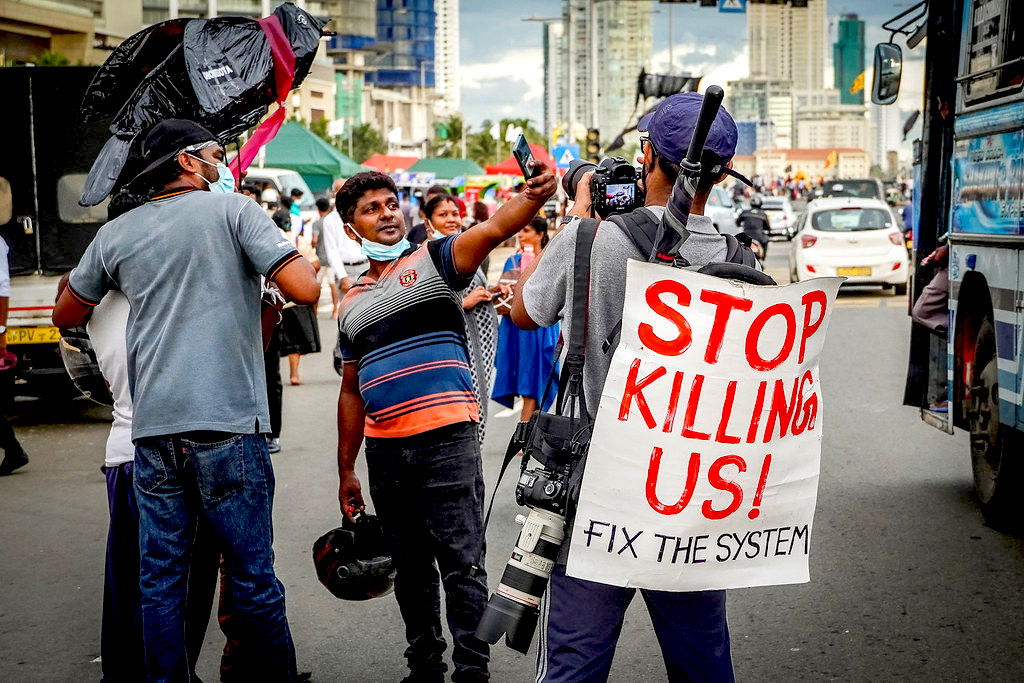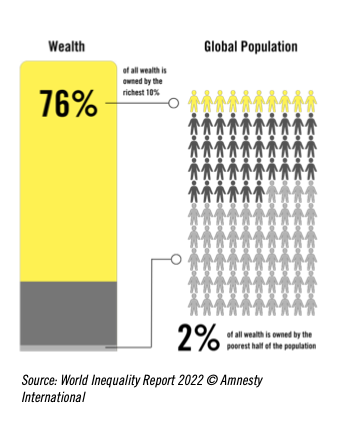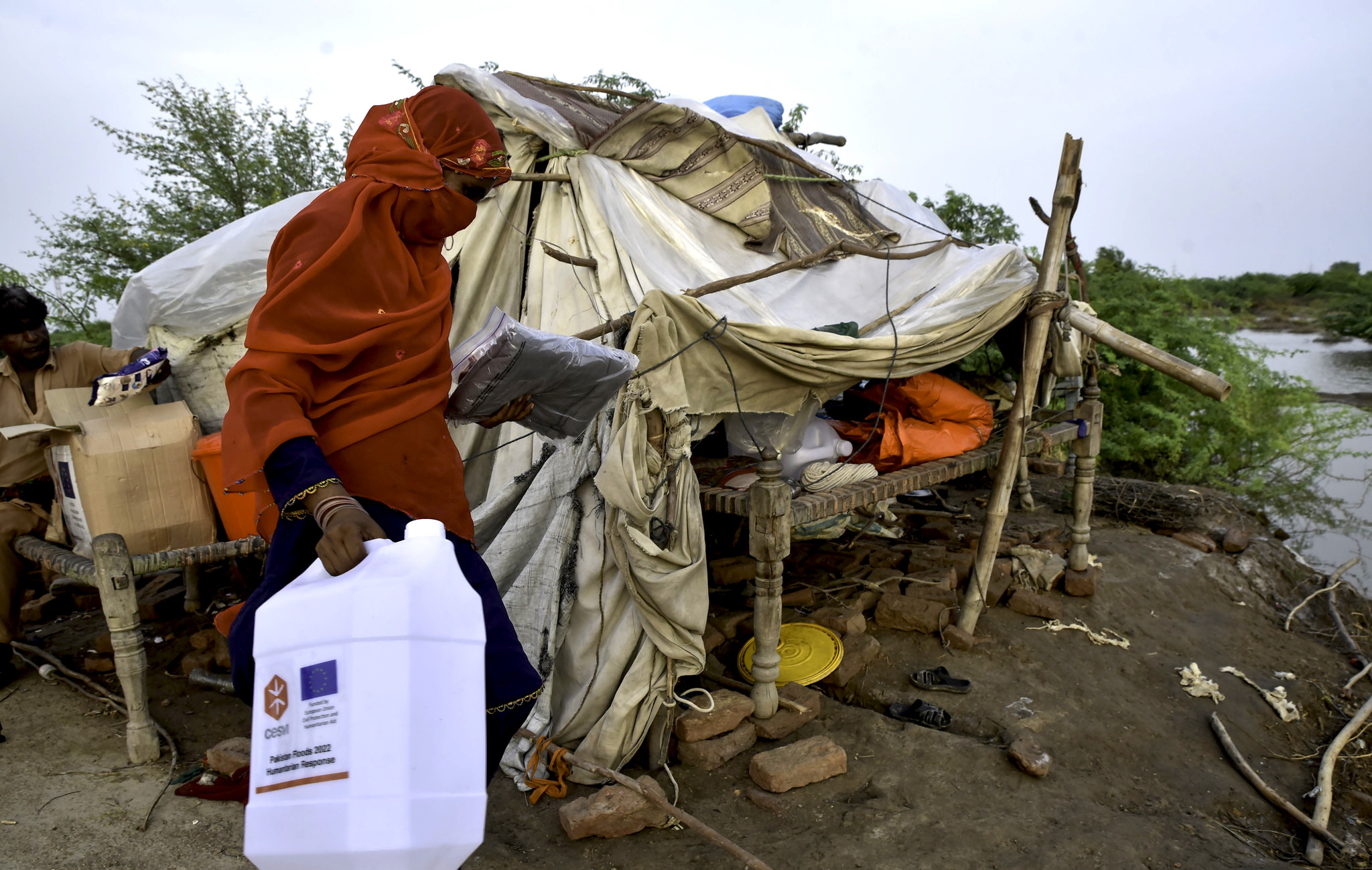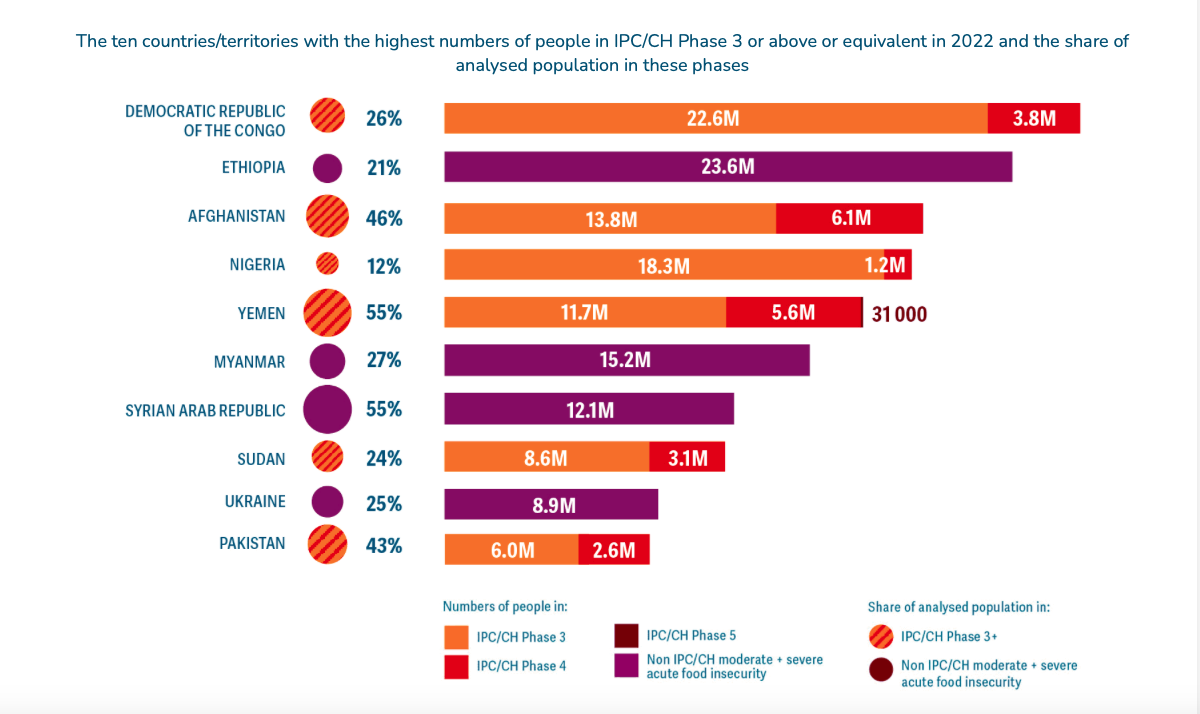Amnesty lamented that governments have turned to “repression and unnecessary and excessive use of force” against struggling demonstrators instead of addressing their core concerns, such as high food prices and paltry wages.

Demonstrators on April 28, 2022, in Colombo, during the months’ long anti-government protests over the economic crisis in Sri Lanka. (Nazly Ahmed/Flickr,CC BY-NC-SA 2.0)
With global poverty and hunger rising amid the intertwining crises of war, public-health emergencies and climate change, Amnesty International this week issued an urgent call for governments worldwide to implement universal social protections to ensure that healthcare, childcare, pensions, disability payments and other benefits are available to all who need them.
Noting that many popular uprisings and mass protests across the globe in recent years have been fueled by economic and social concerns, Amnesty lamented that governments have turned to “repression and unnecessary and excessive use of force” against struggling demonstrators instead of addressing their core concerns, such as high food prices and paltry wages.
“A key factor behind the economic insecurity driving many protests is the fact that the vast majority of people simply do not enjoy their right to social security, realized through the implementation of social protection measures, in a way that would protect them from crises and precarity and support them to recover,” noted a new Amnesty policy brief titled “Rising Prices, Growing Protests: The Case for Universal Social Protection.”
 Amnesty estimated that more than half of the world’s population is not covered by “any social protection measure other than healthcare, rising to over 80% in Africa.”
Amnesty estimated that more than half of the world’s population is not covered by “any social protection measure other than healthcare, rising to over 80% in Africa.”
“It is shocking that over 4 billion people, or about 55% of the world’s population, have no recourse to even the most basic social protection, despite the right to social security being enshrined since 1948 in the Universal Declaration of Human Rights,” said Agnès Callamard, Amnesty International’s secretary-general.
Amnesty’s brief demanded that all governments “invest in social protection measures that guarantee the right to social security, ensuring that everyone has access to adequate levels of healthcare; parental care and benefits; family and child benefits; basic income security for persons in active age who are unable to earn sufficient income, in cases of sickness, unemployment, and disability; and basic income security for older persons.”
More broadly, the humanitarian group’s report encourages nations to move away from means-tested policy approaches in favor of “universal social protection” that covers everyone regardless of income.
“Protecting people against losses due to shocks, from disasters or economic reversals, can be transformational, both for society and the state that provides the support, by reducing social tension and conflict and promoting recovery,” said Callamard. “It enables children to stay in education, improves healthcare, reduces poverty and income inequality, and ultimately benefits societies economically.”

A woman in Sindh, Pakistan, was living in a shelter made of sticks and cloths after her home was destroyed by flooding in 2022. (European Union, Flicker CC BY 2.0)
To help countries establish universal protection systems, Amnesty expressed support for a global fund that would “offer states technical and financial support to provide social security” — an idea that has been endorsed by the United Nations secretary-general and the International Labor Organization.
“While the specifics of the creation and implementation of such a fund will need to be agreed upon,” Amnesty acknowledged, “the current situation triggered by the pandemic, the climate crisis, and the fallout from the invasion of Ukraine has made it clear that there is an urgent need for a global mechanism that will facilitate comprehensive social protection coverage from current and future shocks.”
For the first time in decades, global poverty and hunger is surging – and people are taking to the streets.@Amnesty is calling for debt relief, tax justice and a new global fund to invest in universal social protection.
It's a human right, after all.https://t.co/zZiI3Q1yOE
— Steve Cockburn (@stevecockburn) May 10, 2023
On top of robust investments in social protections, Amnesty’s brief called on international creditors to “reschedule or cancel debts” to allow countries to prioritize investments in healthcare, food programs, and other priorities over costly debt repayments.
Amnesty also urged governments to do all they can to crack down on tax avoidance by the wealthy and enact progressive tax reforms — revenue from which could be used to fund social programs.
“We cannot continue to look away as inequality soars, and those struggling are left to suffer,” Callamard said. “Tax evasion and aggressive tax avoidance by individuals and corporations are depriving states and particularly lower-income countries of the resources they need.”
Amnesty’s brief came as aid groups and experts continue to assess the toll that the global coronavirus pandemic, Russia’s intervention in Ukraine and the worsening climate emergency have taken on the world’s most vulnerable people.
Nearly 260 million people in 58 countries are currently experiencing acute hunger, an increase of 65 million from last year, according to a report published earlier this month by the Food Security Information Network.

(Food Security Information Network’s report, “2023 Global Report on Food Crises”)
“For global hunger to rise for a fifth consecutive year in a world of plenty is a stain on our collective humanity,” Emily Farr, Oxfam International’s global food and economic security lead, said in response to the report.
“We need an urgent and fundamental shift in our humanitarian system if we are to put the brakes on the speeding hunger crisis,” said Farr. “Funds must be used to equip poor countries to prepare for and cope with reoccurring economic and climate shocks before they happen, and rich donors must immediately inject money to meet the U.N. appeal for response.”
“But just ‘band-aid’ funding will only temporarily delay the problem,” Farr added. “We must do more in resolving conflict, inequality, and climate change. Warring parties must lower their guns. Rich polluting nations must cut their emissions. Governments must tax the rich and polluters to free funds for social protection and climate mitigation to help vulnerable people cope with shocks.”
Jake Johnson is a staff writer for Common Dreams.
This article is from Common Dreams.
The views expressed in this article and may or may not reflect those of Consortium News.
Support CN’s Spring
Fund Drive Today


Amnesty International used to be effective at getting political prisoners out of jail. Now it has decided to become a political action movement to transform the world into a more humane place by calling out the rich and powerful.
I would be happier if Amnesty focused its energy on getting Julian Assange out of prison. Not that I’m against making the world a friendlier place, but I don’t think Amnesty really has a handle on that.
It has always been like this in South Indian. Monsoon. Two seasons, one with rain all day every day, and the other with no rain any day. Upper classes have access to homes with good drainage. Poor people can build homes in the lower areas. When their area fills with water, they make huts from palm fronds on the sides of the streets and live there until the low area dries up again.
This year’s rain was very much worse in some areas such as Pakistan–and California.
Military spending is shamelessly and dramatically increasing across the world, even as hunger and inequality rise even more. We are on a road to doom, even without the scientifically predicted major magnetic solar pulse hitting the planet and wiping out most of the technology economies increasingly rely upon to survive. Once the sun burps and very large EMP hits everything changes and billions are likely to die horrible deaths worldwide and including America and Europe due largely to starvation caused by the disruption. We have entered the most critical and fragile state civilizations have ever experience, with no hope in sight, something Amnesty forewarns about without expressly stating it — the highway to doom.
hxxps://en.wikipedia.org/wiki/Carrington_Event#:~:text=The%20July%202012%20solar%20storm,during%20the%201859%20Carrington%20Event.
Okay, I may have exaggerated, but even so, methinks our increasing reliance on technology is a major concern, even without mentioning how fast AI is moving to replace jobs tens of millions of people rely upon to survive economically and socially. Hmmm?
I don’t think it exaggeration Rudy. People are afraid to say the truth mostly. AI is definitely a growing problem. Remember what Stephen Hawkings said about technology being the downfall of mankind. Here is the title of an article from the Guardian on 10th May:
“AI poses existential threat and risk to health of millions, experts warn”
“BMJ Global Health article calls for halt to ‘development of self-improving artificial general intelligence’ until regulation in place”
This is only one sphere of AI of course.
It is interesting that five of the ten countries on the list above are where the “west”, most especially the US, have instigated, perpetrated and/or supported instability and war:
Afghanistan, Yemen, Syria, Sudan, Ukraine
If Amnesty wants to help the people on that Food Security list …. they need to go talk to their friend Joe.
3 of those countries are the sites of American wars, where the American government is only seeking escalation and pumping the nation full of guns … not food. (Syria, Ukraine, Yemen)
Sudan has recently been added to the war list, although it won’t show in these older stats.
Pakistan has recently had its government overthrown by the Americans, and ‘security forces’ are killing protestors in the streets.
In Afghanistan, 20 years of American rule and lots of American aid has obviously done nothing for the people. Which is probably why America got chased out of there. Which was then Biden’s excuse for stealing $billions from the people of that poor nation, some of which he gave to the families of stockbrokers (aka, “9-11 Victims”). A recent report spoke of an emergency, immediate need for $900 million … IIRC, Biden still has in the ‘frozen’ accounts some $3billion which he has not yet completely stolen …. not a peep of a hint that he might release this money to help the starving. He’ll give money to people with more than the insured $250k in cash in a single bank account, but starving people … forgetaboutit.
If Amnesty wants to address this problem, then they need to begin at home. But in America, there is a bi-partisan consensus on ‘Repression’ and ‘Social Protection’ is regarded as one of those evil Commie ideas. Amnesty could at this time focus all of their efforts on opposing American policy to try to do some good along these lines. Don’t hold your breath though.
All true Zen. Let us not forget Haiti in that list. Another disaster.
From the article:
“We must do more in resolving conflict, inequality, and climate change. Warring parties must lower their guns. Rich polluting nations must cut their emissions. Governments must tax the rich and polluters to free funds for social protection and climate mitigation to help vulnerable people cope with shocks.”
We’ve been saying all this for years. The great unravelling continues unabated.